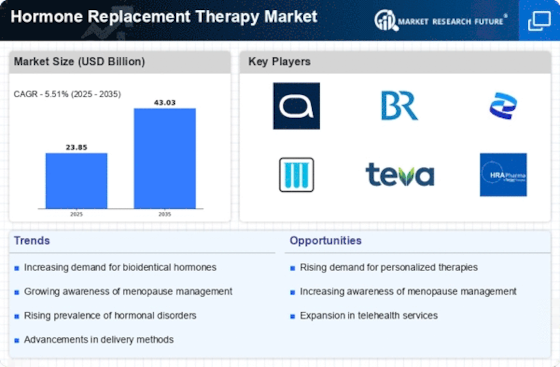Menopause Treatment
Hormonal Imbalance Treatment
Transgender Hormone Therapy
Age-Related Hormonal Decline
Estrogen
Testosterone
Progesterone
Thyroid Hormones
Oral
Transdermal
Injectable
Implantable
Hospitals
Outpatient Clinics
Home Care
North America
Europe
South America
Asia Pacific
Middle East and Africa
North America Outlook (USD Billion, 2019-2035)
North America Hormone Replacement Therapy Market by Application Type
Menopause Treatment
Hormonal Imbalance Treatment
Transgender Hormone Therapy
Age-Related Hormonal Decline
North America Hormone Replacement Therapy Market by Hormone Type
Estrogen
Testosterone
Progesterone
Thyroid Hormones
North America Hormone Replacement Therapy Market by Route of Administration Type
Oral
Transdermal
Injectable
Implantable
North America Hormone Replacement Therapy Market by End User Type
Hospitals
Outpatient Clinics
Home Care
North America Hormone Replacement Therapy Market by Regional Type
US
Canada
US Outlook (USD Billion, 2019-2035)
US Hormone Replacement Therapy Market by Application Type
Menopause Treatment
Hormonal Imbalance Treatment
Transgender Hormone Therapy
Age-Related Hormonal Decline
US Hormone Replacement Therapy Market by Hormone Type
Estrogen
Testosterone
Progesterone
Thyroid Hormones
US Hormone Replacement Therapy Market by Route of Administration Type
Oral
Transdermal
Injectable
Implantable
US Hormone Replacement Therapy Market by End User Type
Hospitals
Outpatient Clinics
Home Care
CANADA Outlook (USD Billion, 2019-2035)
CANADA Hormone Replacement Therapy Market by Application Type
Menopause Treatment
Hormonal Imbalance Treatment
Transgender Hormone Therapy
Age-Related Hormonal Decline
CANADA Hormone Replacement Therapy Market by Hormone Type
Estrogen
Testosterone
Progesterone
Thyroid Hormones
CANADA Hormone Replacement Therapy Market by Route of Administration Type
Oral
Transdermal
Injectable
Implantable
CANADA Hormone Replacement Therapy Market by End User Type
Hospitals
Outpatient Clinics
Home Care
Europe Outlook (USD Billion, 2019-2035)
Europe Hormone Replacement Therapy Market by Application Type
Menopause Treatment
Hormonal Imbalance Treatment
Transgender Hormone Therapy
Age-Related Hormonal Decline
Europe Hormone Replacement Therapy Market by Hormone Type
Estrogen
Testosterone
Progesterone
Thyroid Hormones
Europe Hormone Replacement Therapy Market by Route of Administration Type
Oral
Transdermal
Injectable
Implantable
Europe Hormone Replacement Therapy Market by End User Type
Hospitals
Outpatient Clinics
Home Care
Europe Hormone Replacement Therapy Market by Regional Type
Germany
UK
France
Russia
Italy
Spain
Rest of Europe
GERMANY Outlook (USD Billion, 2019-2035)
GERMANY Hormone Replacement Therapy Market by Application Type
Menopause Treatment
Hormonal Imbalance Treatment
Transgender Hormone Therapy
Age-Related Hormonal Decline
GERMANY Hormone Replacement Therapy Market by Hormone Type
Estrogen
Testosterone
Progesterone
Thyroid Hormones
GERMANY Hormone Replacement Therapy Market by Route of Administration Type
Oral
Transdermal
Injectable
Implantable
GERMANY Hormone Replacement Therapy Market by End User Type
Hospitals
Outpatient Clinics
Home Care
UK Outlook (USD Billion, 2019-2035)
UK Hormone Replacement Therapy Market by Application Type
Menopause Treatment
Hormonal Imbalance Treatment
Transgender Hormone Therapy
Age-Related Hormonal Decline
UK Hormone Replacement Therapy Market by Hormone Type
Estrogen
Testosterone
Progesterone
Thyroid Hormones
UK Hormone Replacement Therapy Market by Route of Administration Type
Oral
Transdermal
Injectable
Implantable
UK Hormone Replacement Therapy Market by End User Type
Hospitals
Outpatient Clinics
Home Care
FRANCE Outlook (USD Billion, 2019-2035)
FRANCE Hormone Replacement Therapy Market by Application Type
Menopause Treatment
Hormonal Imbalance Treatment
Transgender Hormone Therapy
Age-Related Hormonal Decline
FRANCE Hormone Replacement Therapy Market by Hormone Type
Estrogen
Testosterone
Progesterone
Thyroid Hormones
FRANCE Hormone Replacement Therapy Market by Route of Administration Type
Oral
Transdermal
Injectable
Implantable
FRANCE Hormone Replacement Therapy Market by End User Type
Hospitals
Outpatient Clinics
Home Care
RUSSIA Outlook (USD Billion, 2019-2035)
RUSSIA Hormone Replacement Therapy Market by Application Type
Menopause Treatment
Hormonal Imbalance Treatment
Transgender Hormone Therapy
Age-Related Hormonal Decline
RUSSIA Hormone Replacement Therapy Market by Hormone Type
Estrogen
Testosterone
Progesterone
Thyroid Hormones
RUSSIA Hormone Replacement Therapy Market by Route of Administration Type
Oral
Transdermal
Injectable
Implantable
RUSSIA Hormone Replacement Therapy Market by End User Type
Hospitals
Outpatient Clinics
Home Care
ITALY Outlook (USD Billion, 2019-2035)
ITALY Hormone Replacement Therapy Market by Application Type
Menopause Treatment
Hormonal Imbalance Treatment
Transgender Hormone Therapy
Age-Related Hormonal Decline
ITALY Hormone Replacement Therapy Market by Hormone Type
Estrogen
Testosterone
Progesterone
Thyroid Hormones
ITALY Hormone Replacement Therapy Market by Route of Administration Type
Oral
Transdermal
Injectable
Implantable
ITALY Hormone Replacement Therapy Market by End User Type
Hospitals
Outpatient Clinics
Home Care
SPAIN Outlook (USD Billion, 2019-2035)
SPAIN Hormone Replacement Therapy Market by Application Type
Menopause Treatment
Hormonal Imbalance Treatment
Transgender Hormone Therapy
Age-Related Hormonal Decline
SPAIN Hormone Replacement Therapy Market by Hormone Type
Estrogen
Testosterone
Progesterone
Thyroid Hormones
SPAIN Hormone Replacement Therapy Market by Route of Administration Type
Oral
Transdermal
Injectable
Implantable
SPAIN Hormone Replacement Therapy Market by End User Type
Hospitals
Outpatient Clinics
Home Care
REST OF EUROPE Outlook (USD Billion, 2019-2035)
REST OF EUROPE Hormone Replacement Therapy Market by Application Type
Menopause Treatment
Hormonal Imbalance Treatment
Transgender Hormone Therapy
Age-Related Hormonal Decline
REST OF EUROPE Hormone Replacement Therapy Market by Hormone Type
Estrogen
Testosterone
Progesterone
Thyroid Hormones
REST OF EUROPE Hormone Replacement Therapy Market by Route of Administration Type
Oral
Transdermal
Injectable
Implantable
REST OF EUROPE Hormone Replacement Therapy Market by End User Type
Hospitals
Outpatient Clinics
Home Care
APAC Outlook (USD Billion, 2019-2035)
APAC Hormone Replacement Therapy Market by Application Type
Menopause Treatment
Hormonal Imbalance Treatment
Transgender Hormone Therapy
Age-Related Hormonal Decline
APAC Hormone Replacement Therapy Market by Hormone Type
Estrogen
Testosterone
Progesterone
Thyroid Hormones
APAC Hormone Replacement Therapy Market by Route of Administration Type
Oral
Transdermal
Injectable
Implantable
APAC Hormone Replacement Therapy Market by End User Type
Hospitals
Outpatient Clinics
Home Care
APAC Hormone Replacement Therapy Market by Regional Type
China
India
Japan
South Korea
Malaysia
Thailand
Indonesia
Rest of APAC
CHINA Outlook (USD Billion, 2019-2035)
CHINA Hormone Replacement Therapy Market by Application Type
Menopause Treatment
Hormonal Imbalance Treatment
Transgender Hormone Therapy
Age-Related Hormonal Decline
CHINA Hormone Replacement Therapy Market by Hormone Type
Estrogen
Testosterone
Progesterone
Thyroid Hormones
CHINA Hormone Replacement Therapy Market by Route of Administration Type
Oral
Transdermal
Injectable
Implantable
CHINA Hormone Replacement Therapy Market by End User Type
Hospitals
Outpatient Clinics
Home Care
INDIA Outlook (USD Billion, 2019-2035)
INDIA Hormone Replacement Therapy Market by Application Type
Menopause Treatment
Hormonal Imbalance Treatment
Transgender Hormone Therapy
Age-Related Hormonal Decline
INDIA Hormone Replacement Therapy Market by Hormone Type
Estrogen
Testosterone
Progesterone
Thyroid Hormones
INDIA Hormone Replacement Therapy Market by Route of Administration Type
Oral
Transdermal
Injectable
Implantable
INDIA Hormone Replacement Therapy Market by End User Type
Hospitals
Outpatient Clinics
Home Care
JAPAN Outlook (USD Billion, 2019-2035)
JAPAN Hormone Replacement Therapy Market by Application Type
Menopause Treatment
Hormonal Imbalance Treatment
Transgender Hormone Therapy
Age-Related Hormonal Decline
JAPAN Hormone Replacement Therapy Market by Hormone Type
Estrogen
Testosterone
Progesterone
Thyroid Hormones
JAPAN Hormone Replacement Therapy Market by Route of Administration Type
Oral
Transdermal
Injectable
Implantable
JAPAN Hormone Replacement Therapy Market by End User Type
Hospitals
Outpatient Clinics
Home Care
SOUTH KOREA Outlook (USD Billion, 2019-2035)
SOUTH KOREA Hormone Replacement Therapy Market by Application Type
Menopause Treatment
Hormonal Imbalance Treatment
Transgender Hormone Therapy
Age-Related Hormonal Decline
SOUTH KOREA Hormone Replacement Therapy Market by Hormone Type
Estrogen
Testosterone
Progesterone
Thyroid Hormones
SOUTH KOREA Hormone Replacement Therapy Market by Route of Administration Type
Oral
Transdermal
Injectable
Implantable
SOUTH KOREA Hormone Replacement Therapy Market by End User Type
Hospitals
Outpatient Clinics
Home Care
MALAYSIA Outlook (USD Billion, 2019-2035)
MALAYSIA Hormone Replacement Therapy Market by Application Type
Menopause Treatment
Hormonal Imbalance Treatment
Transgender Hormone Therapy
Age-Related Hormonal Decline
MALAYSIA Hormone Replacement Therapy Market by Hormone Type
Estrogen
Testosterone
Progesterone
Thyroid Hormones
MALAYSIA Hormone Replacement Therapy Market by Route of Administration Type
Oral
Transdermal
Injectable
Implantable
MALAYSIA Hormone Replacement Therapy Market by End User Type
Hospitals
Outpatient Clinics
Home Care
THAILAND Outlook (USD Billion, 2019-2035)
THAILAND Hormone Replacement Therapy Market by Application Type
Menopause Treatment
Hormonal Imbalance Treatment
Transgender Hormone Therapy
Age-Related Hormonal Decline
THAILAND Hormone Replacement Therapy Market by Hormone Type
Estrogen
Testosterone
Progesterone
Thyroid Hormones
THAILAND Hormone Replacement Therapy Market by Route of Administration Type
Oral
Transdermal
Injectable
Implantable
THAILAND Hormone Replacement Therapy Market by End User Type
Hospitals
Outpatient Clinics
Home Care
INDONESIA Outlook (USD Billion, 2019-2035)
INDONESIA Hormone Replacement Therapy Market by Application Type
Menopause Treatment
Hormonal Imbalance Treatment
Transgender Hormone Therapy
Age-Related Hormonal Decline
INDONESIA Hormone Replacement Therapy Market by Hormone Type
Estrogen
Testosterone
Progesterone
Thyroid Hormones
INDONESIA Hormone Replacement Therapy Market by Route of Administration Type
Oral
Transdermal
Injectable
Implantable
INDONESIA Hormone Replacement Therapy Market by End User Type
Hospitals
Outpatient Clinics
Home Care
REST OF APAC Outlook (USD Billion, 2019-2035)
REST OF APAC Hormone Replacement Therapy Market by Application Type
Menopause Treatment
Hormonal Imbalance Treatment
Transgender Hormone Therapy
Age-Related Hormonal Decline
REST OF APAC Hormone Replacement Therapy Market by Hormone Type
Estrogen
Testosterone
Progesterone
Thyroid Hormones
REST OF APAC Hormone Replacement Therapy Market by Route of Administration Type
Oral
Transdermal
Injectable
Implantable
REST OF APAC Hormone Replacement Therapy Market by End User Type
Hospitals
Outpatient Clinics
Home Care
South America Outlook (USD Billion, 2019-2035)
South America Hormone Replacement Therapy Market by Application Type
Menopause Treatment
Hormonal Imbalance Treatment
Transgender Hormone Therapy
Age-Related Hormonal Decline
South America Hormone Replacement Therapy Market by Hormone Type
Estrogen
Testosterone
Progesterone
Thyroid Hormones
South America Hormone Replacement Therapy Market by Route of Administration Type
Oral
Transdermal
Injectable
Implantable
South America Hormone Replacement Therapy Market by End User Type
Hospitals
Outpatient Clinics
Home Care
South America Hormone Replacement Therapy Market by Regional Type
Brazil
Mexico
Argentina
Rest of South America
BRAZIL Outlook (USD Billion, 2019-2035)
BRAZIL Hormone Replacement Therapy Market by Application Type
Menopause Treatment
Hormonal Imbalance Treatment
Transgender Hormone Therapy
Age-Related Hormonal Decline
BRAZIL Hormone Replacement Therapy Market by Hormone Type
Estrogen
Testosterone
Progesterone
Thyroid Hormones
BRAZIL Hormone Replacement Therapy Market by Route of Administration Type
Oral
Transdermal
Injectable
Implantable
BRAZIL Hormone Replacement Therapy Market by End User Type
Hospitals
Outpatient Clinics
Home Care
MEXICO Outlook (USD Billion, 2019-2035)
MEXICO Hormone Replacement Therapy Market by Application Type
Menopause Treatment
Hormonal Imbalance Treatment
Transgender Hormone Therapy
Age-Related Hormonal Decline
MEXICO Hormone Replacement Therapy Market by Hormone Type
Estrogen
Testosterone
Progesterone
Thyroid Hormones
MEXICO Hormone Replacement Therapy Market by Route of Administration Type
Oral
Transdermal
Injectable
Implantable
MEXICO Hormone Replacement Therapy Market by End User Type
Hospitals
Outpatient Clinics
Home Care
ARGENTINA Outlook (USD Billion, 2019-2035)
ARGENTINA Hormone Replacement Therapy Market by Application Type
Menopause Treatment
Hormonal Imbalance Treatment
Transgender Hormone Therapy
Age-Related Hormonal Decline
ARGENTINA Hormone Replacement Therapy Market by Hormone Type
Estrogen
Testosterone
Progesterone
Thyroid Hormones
ARGENTINA Hormone Replacement Therapy Market by Route of Administration Type
Oral
Transdermal
Injectable
Implantable
ARGENTINA Hormone Replacement Therapy Market by End User Type
Hospitals
Outpatient Clinics
Home Care
REST OF SOUTH AMERICA Outlook (USD Billion, 2019-2035)
REST OF SOUTH AMERICA Hormone Replacement Therapy Market by Application Type
Menopause Treatment
Hormonal Imbalance Treatment
Transgender Hormone Therapy
Age-Related Hormonal Decline
REST OF SOUTH AMERICA Hormone Replacement Therapy Market by Hormone Type
Estrogen
Testosterone
Progesterone
Thyroid Hormones
REST OF SOUTH AMERICA Hormone Replacement Therapy Market by Route of Administration Type
Oral
Transdermal
Injectable
Implantable
REST OF SOUTH AMERICA Hormone Replacement Therapy Market by End User Type
Hospitals
Outpatient Clinics
Home Care
MEA Outlook (USD Billion, 2019-2035)
MEA Hormone Replacement Therapy Market by Application Type
Menopause Treatment
Hormonal Imbalance Treatment
Transgender Hormone Therapy
Age-Related Hormonal Decline
MEA Hormone Replacement Therapy Market by Hormone Type
Estrogen
Testosterone
Progesterone
Thyroid Hormones
MEA Hormone Replacement Therapy Market by Route of Administration Type
Oral
Transdermal
Injectable
Implantable
MEA Hormone Replacement Therapy Market by End User Type
Hospitals
Outpatient Clinics
Home Care
MEA Hormone Replacement Therapy Market by Regional Type
GCC Countries
South Africa
Rest of MEA
GCC COUNTRIES Outlook (USD Billion, 2019-2035)
GCC COUNTRIES Hormone Replacement Therapy Market by Application Type
Menopause Treatment
Hormonal Imbalance Treatment
Transgender Hormone Therapy
Age-Related Hormonal Decline
GCC COUNTRIES Hormone Replacement Therapy Market by Hormone Type
Estrogen
Testosterone
Progesterone
Thyroid Hormones
GCC COUNTRIES Hormone Replacement Therapy Market by Route of Administration Type
Oral
Transdermal
Injectable
Implantable
GCC COUNTRIES Hormone Replacement Therapy Market by End User Type
Hospitals
Outpatient Clinics
Home Care
SOUTH AFRICA Outlook (USD Billion, 2019-2035)
SOUTH AFRICA Hormone Replacement Therapy Market by Application Type
Menopause Treatment
Hormonal Imbalance Treatment
Transgender Hormone Therapy
Age-Related Hormonal Decline
SOUTH AFRICA Hormone Replacement Therapy Market by Hormone Type
Estrogen
Testosterone
Progesterone
Thyroid Hormones
SOUTH AFRICA Hormone Replacement Therapy Market by Route of Administration Type
Oral
Transdermal
Injectable
Implantable
SOUTH AFRICA Hormone Replacement Therapy Market by End User Type
Hospitals
Outpatient Clinics
Home Care
REST OF MEA Outlook (USD Billion, 2019-2035)
REST OF MEA Hormone Replacement Therapy Market by Application Type
Menopause Treatment
Hormonal Imbalance Treatment
Transgender Hormone Therapy
Age-Related Hormonal Decline
REST OF MEA Hormone Replacement Therapy Market by Hormone Type
Estrogen
Testosterone
Progesterone
Thyroid Hormones
REST OF MEA Hormone Replacement Therapy Market by Route of Administration Type
Oral
Transdermal
Injectable
Implantable
REST OF MEA Hormone Replacement Therapy Market by End User Type
Hospitals
Outpatient Clinics
Home Care


















Leave a Comment